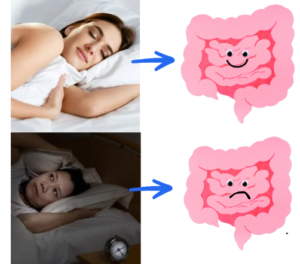Unveiling the Crucial Connection Between High-Quality Sleep and Digestive Health
Sleep is far more than just a period of rest; it represents a fundamental biological process that profoundly impacts our digestion. The intricate relationship between sleep and digestive health involves a variety of complex physiological mechanisms that work in concert. The body’s circadian rhythm, or internal biological clock, plays a pivotal role in synchronising both sleep cycles and digestive functions. This alignment clarifies why individuals frequently experience hunger at consistent times each day, showcasing how our bodies are finely tuned to respond to natural biological cycles.
Understanding the Importance of Restorative Sleep for Optimal Digestive Functioning 
Sleep is essential for the body’s ability to heal, regenerate, and restore its various functions. The deeper stages of sleep are particularly crucial for these restorative activities. During these profound phases, the organs, tissues, and cells constituting the digestive system enter a state of relaxation and engage in vital repair processes. The body prioritises cellular repair and growth during deep sleep, especially concerning the regeneration of cells lining the digestive tract, which undergo continuous wear and tear from food particles and digestive enzymes. This regeneration is key to maintaining the integrity of the gastrointestinal lining, significantly enhancing the efficiency of digestion.
Deep sleep plays a vital role in strengthening the immune system, which is particularly important for the digestive system, as it contains specialised immune cells activated by beneficial gut bacteria. These immune cells are crucial for protecting the gut and the overall digestive system against harmful microorganisms, ensuring a balanced microbial population in the gut environment. This balance is essential for not just digestive health, but also for maintaining overall well-being.
Moreover, the organs within the digestive system play a significant role in detoxifying the body, helping to eliminate waste and harmful substances. Deep sleep enhances this detoxification process by optimising the functioning of the liver and kidneys, allowing these vital organs to operate at their best. This interaction between sleep and detoxification is instrumental in promoting overall digestive health and wellness, reflecting the importance of quality rest.
Investigating the Link Between Gut Motility and Sleep Patterns
A crucial aspect of digestion involves the efficient movement of food and waste through the digestive tract, a process known as gut motility. This process undergoes significant changes during sleep. During both deep and light sleep, the rate of gut motility diminishes considerably. This reduction is a necessary adjustment that enables the digestive system to conserve energy, which is then redirected towards repairing digestive tissues. This energy conservation is vital, allowing the digestive process to operate more effectively when awake, optimising nutrient absorption and waste elimination.
The migrating motor complex is a cycle of contractions that occurs during fasting periods, including during sleep. This cycle is essential for gut motility, effectively sweeping away food particles and residue that may remain in the digestive system. This natural cleansing mechanism of the digestive tract helps minimise the risks of bacterial overgrowth, contributing to a healthy gut environment. Notably, the migrating motor complex is most active during the night when individuals are fasting and asleep, emphasising the essential role of sleep in preserving the health of the digestive system.
As morning approaches, gut motility gradually increases, effectively preparing the digestive system to process and digest food efficiently. This rise in motility can also trigger the first bowel movement of the day, illustrating the finely tuned relationship between sleep and gut motility. Grasping this connection is essential for optimising digestive health and enhancing overall well-being.
Examining Hormonal Interactions Affecting Sleep and Digestive Health
Ghrelin, often termed the hunger hormone, plays a significant role in stimulating appetite. In contrast, leptin signals to the brain that the stomach is full, helping to prevent overeating. Together, these hormones are pivotal in regulating appetite; however, their functions can be negatively impacted by insufficient sleep.
Even just one night of inadequate sleep can result in increased levels of ghrelin, which can lead to heightened appetite and cravings for carbohydrates. This phenomenon is often described as feeling ‘hangry’. Compounding this issue, levels of leptin may decline following a night of insufficient sleep, disrupting the signals that indicate fullness. This creates a challenging scenario where individuals find themselves overeating and making unhealthy food choices while struggling to recognise their body’s cues to cease eating. While occasional poor sleep may not lead to severe repercussions, chronic insomnia can result in considerable digestive issues, including gut inflammation, liver disorders, gastroesophageal reflux disease, inflammatory bowel disease, and even colorectal cancer, alongside contributing to weight gain.
Identifying the Consequences of Sleep Disruption on Digestive Health
Disruptions to sleep can lead to various digestive issues. Factors such as shift work, particularly night shifts, and experiencing jet lag can significantly interfere with sleep patterns, throwing off the body’s internal clock. Furthermore, consuming late-night meals or having irregular meal times can adversely affect the quality of sleep. The circadian rhythm that governs sleep is closely tied to natural light, essential for maintaining a healthy sleep-wake cycle.
Unfortunately, in our contemporary technology-driven world, many individuals spend the majority of their daytime indoors, leading to reduced exposure to natural light. This shift has also resulted in increased exposure to blue light emitted from devices such as laptops, televisions, and smartphones, further disrupting the sleep cycle and sleep patterns, particularly when this exposure occurs shortly before bedtime.
The cumulative effects of these factors can lead to severe digestive issues, including diarrhoea, ulcers, inflammatory bowel disease, or disruption to the delicate balance between beneficial and pathogenic bacteria in the gut. This imbalance can further damage the gut lining, complicating the situation regarding digestive health.
Enhancing Microbiome Health Through Quality Sleep Practices
The microbiome refers to the trillions of microorganisms residing in the gut, predominantly consisting of beneficial bacteria known as probiotics, alongside viruses, fungi, and potentially harmful bacteria. These microbes are vital not only for overall health but also for digestive health. They enhance immune responses and assist in digestion, facilitating the production of essential vitamins, enzymes, hormones, and amino acids. Recent studies have highlighted a significant link between the microbiome and sleep, indicating that disrupted sleep or chronic insomnia can negatively affect the balance of these microbes, ultimately influencing digestive health and general well-being.
Deciphering the Complex Relationship Between Microbiome Health and Quality Sleep
The dynamic between sleep and microbiome health is intricate and multifaceted. Poor sleep can adversely affect microbiome health, while an unbalanced microbiome can also detrimentally influence sleep quality. To understand this complex interplay, one study revealed a correlation between a higher abundance of specific bacterial types in the gut and quicker sleep onset, along with fewer nocturnal awakenings. Although this article cannot encompass all findings, the key takeaway is that nurturing a diverse and abundant population of beneficial bacteria in the gut is crucial for achieving optimal sleep, effective digestion, and maintaining overall health.
Investigating the Interrelationship Between Stress, Sleep, and Digestive Health
A common result of stress and anxiety is disrupted sleep. Conversely, these mental health issues can also negatively impact the physical health and functionality of the digestive system. Such disruptions can lead to altered gut motility and contribute to conditions like indigestion, ulcers, and irritable bowel syndrome. A crucial factor in this relationship is the effect of the so-called stress hormone, cortisol.
The Impact of Cortisol on Digestive Processes
When cortisol levels increase, the body’s response is to enter a fight-or-flight state. This physiological reaction results in blood flow being redirected to critical areas such as the heart, brain, lungs, and muscles, while diverting it away from the digestive system. This shift prepares the individual to either confront danger or escape, a survival mechanism that was vital in prehistoric times.
In modern contexts, however, stressors are often less life-threatening, such as financial pressures, work-related stress, or insufficient sleep. While the short-term diversion of blood flow may be beneficial in acute situations, chronic stress can adversely affect the digestive system, particularly concerning gut motility. This can manifest in symptoms such as constipation, diarrhoea, indigestion, gas, and bloating. Thus, implementing effective stress management strategies is paramount for supporting both gut health and achieving quality sleep.
Ensuring adequate sleep is crucial for maintaining a healthy digestive system, as the connection between sleep and digestion is inherently intertwined. Prioritising effective sleep hygiene practices is vital for achieving restorative sleep. This includes minimising exposure to blue light from electronic devices, adhering to a consistent sleep schedule, creating a cool, dark sleep environment, avoiding food intake within two hours before bedtime, and ensuring exposure to natural light during the day, especially in the morning.
References
Understanding Digestive Health and Circadian Rhythms
Exploring Sleep Dysfunction and Digestive Conditions
Examining the Link Between the Gut Microbiome and Sleep
Investigating Stress and Its Effects on the Digestive System
The Article: How Sleep Affects Your Digestive System appeared first on https://janestevensnutrition.com
The Article: Sleep’s Impact on Your Digestive System Explained appeared first on https://janestevens.net
The Article Sleep’s Impact on Digestive Health Explained Was Found On https://limitsofstrategy.com

